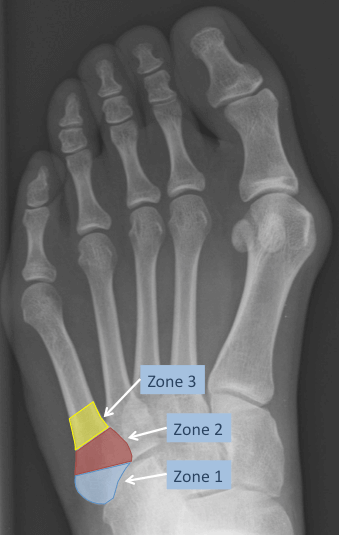Diagnosis
Answer: B) Zone II 5th Metatarsal Base Fracture (Jones Fracture)



Zone II 5th Metatarsal Base Fractures (Jones Fracture):
Answer: B) Zone II 5th Metatarsal Base Fracture (Jones Fracture)



Zone II 5th Metatarsal Base Fractures (Jones Fracture):
Visual diagnosis from EMDaily!
Following a severe brain injury the goal of the clinician is to prevent secondary brain injury. This entails increasing oxygen delivery to the brain by preventing hypoxia and increasing cerebral perfusion. Hyperosmolar therapy, including mannitol and hypertonic saline, is often used to decrease ICP.
A high-yield post on two STEMI mimickers and ways to tell the difference!
Case: 33 year old Vietnamese male with a past medical history notable for TB diagnosed 2 years prior to arrival. Patient was treated for 9 months. Patient presents with slowly and progressive swelling on the left side of the neck.
Answer: C. Lymphadenitis
Diagnosis: Tuberculosis Cervical Lymphadenitis (Scrofula)
This article intends to focus on a particular aspect of the pathophysiology of salicylate toxicity which is correctable, can improve mental status, and potentially stave off intubation: hypoglycorrhachia.
Lacerations of the tongue often require special consideration considering the tongue's anatomic location and functional importance. Repair of tongue lacerations are often plagued by patient intolerance and inadequate anesthesia of the area. This posts aims to introduce the basics of management of tongue lacerations.
Managing Tongue Lacerations:
A high-yield review from the past week on EMDaily!
Staying alert and functioning at a high level during an overnight shift in the Emergency Department is often a matter of life or death for your patients. Many of us employ the use of caffeine at all hours to combat the slow (sometimes rapid) creep of fatigue which hampers our skillset. Most providers can relate to those moments when a cup of coffee is just not what you are looking for. This post intends to introduce an alternative vehicle for caffeine designed for members of the military: Military Energy Gum.
Copyright © 2025,
Designed by Zymphonies
